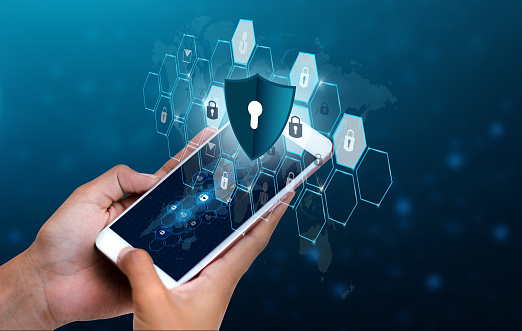
Business smartphones are great tools that allow you to stay in touch with your employees no matter where they are or what time it is, but this increased access can also be dangerous if the wrong people get their hands on your phone. According to Check Point’s Mobile Security Report 2021, most businesses experienced a mobile attack in 2020. From hackers to thieves, there are plenty of people who would love to get their hands on your mobile device and use it to gain access to all of your business information, so it’s important to make sure you buy a secure device that will keep you safe from mobile threats. Here are some security features that any business phone should have.
1. Antivirus Real-Time Protection
One of the best defenses against malware is real-time anti-malware protection. This feature allows your phone’s operating system to update its defenses so it knows when malicious content is introduced. The feature can help protect your phone’s operating system, but it isn’t infallible. Most phones are equipped with anti-malware software from Google or Microsoft, and many also support third-party mobile security apps such as Harmony Mobile of (Check Point), Bitdefender mobile security, or Trend Micro antivirus.
Many antivirus companies now provide free versions of their software for mobile phones, but you can pay for more robust versions that offer extra protection. If you work in an industry where personal data is at risks, such as healthcare or finance, you may want to consider additional security features on your phone. For example, Google offers Android for Work which allows IT administrators to create separate corporate and personal profiles on one device. IronTel implements this important security feature in their secure mobile with Samsung Knox multilayer mobile security system.
There are several options available depending on how much privacy you need for sensitive information. Any time there’s sensitive information involved-whether it be private texts or business documents-you should use extreme caution when choosing what type of content goes onto your device. Just like credit cards have become extremely vulnerable over time, so have computers and smartphones. Protecting yourself from viruses is just as important as protecting yourself from fraudsters trying to steal your identity or hack into financial accounts via malware attacks.
2. Anti-Theft Protection
If someone were to steal your smartphone, they could potentially do a lot of damage. A thief could take pictures of confidential documents, browse through emails, or even delete files. To prevent these types of things from happening, look for a phone with built-in anti-theft technology. Some phones come with a physical lock screen while others require you to enter a PIN code before accessing certain functions. Either way, it’s important to make it difficult for anyone else to access your phone.
GPS tracking apps can help you locate your phone if it’s ever lost or stolen, allowing you to then remotely wipe data from its memory or, even better, set off an alarm so that thieves will find it difficult to sell your device and others won’t be able to access private information. These tracking apps will send you an email notification when your device gains internet connectivity.
3. Remote Wipe and Lock Feature
This feature makes it easy to erase all of your business’s info in case of theft. Even if you think you won’t need it, purchasing a business phone with a remote wipe and lock is always recommended. If your device is ever stolen, you can remotely destroy any data it contains to prevent sensitive company information from being leaked.
You should back up your data regularly, especially if you’re using cloud services. You don’t want to lose everything, in case your smartphone was stolen and you must wipe it out ASAP. You should back up your smartphone’s data, better on a weekly basis, on a local disk (through the USB port), or on a reliable remote cloud service.
Businesses use MDM (Mobile Device Management) systems to provision and remote control employees’ smartphones. With MDM they secure the confidential data of their lost smartphones by locking them remotely or completely wiping out all data.
4. Secure Boot
One of Android’s strongest security features is a feature called secure boot. This ensures that once your phone has booted, any other components-such as applications, services, and radio interfaces-must also be signed by Google to load. By ensuring that any other code loaded on your device has been digitally signed by Google, a secure boot helps prevent malicious applications from being installed on devices running Android 7.0 or higher.
However, not all Android devices support secure boot; it’s up to manufacturers whether they include it or not. In addition, firmware updates can often remove or disable some security features; a company might release an update that removes an authentication mechanism used by Android’s encryption service so it can install its mechanism instead.
5. Full Disk Encryption (FDE)
Another smart security feature you should look for is full disk encryption (FDE). As its name suggests, FDE secures all of your information from prying eyes by encrypting the entire device. If you’re worried about losing your phone or having it stolen, FDE makes it so that if your device falls into anyone else’s hands, they won’t be able to use it. Of course, you can use FDE on any mobile device that uses an operating system with built-in full disk encryption features, but only certain smartphones and tablets support it out of the box.
Full disk encryption secures your data by scrambling all of it into an unintelligible mess that can only be unlocked with a key. The key is derived from two very long strings of random numbers, one string for each half of your master passphrase, which is combined using some form of cryptographic hashing algorithm (think SHA256).
In its most basic implementation, entering your passphrase will yield two identical cryptographic hashes, also known as signatures or cryptographic digests; these hashes are what you’re effectively signing off on when you enter your password. If they match-meaning they correspond to those long strings of random numbers generated during full disk encryption setup-you gain access to all encrypted data on your device.
6. Regular Device Updates
While many devices offer regular updates, you may have to pay a premium if your business mobile phone doesn’t. If it’s on your mind, find out exactly how much it will cost you in terms of both time and money. While regular updates won’t necessarily keep all kinds of malicious applications off your phone, they are essential for keeping any device safe from hackers who are constantly finding new ways to infiltrate security features.
Without regular security updates, hackers could easily hack into an outdated device or take advantage of pre-existing holes in its system; once these holes are discovered, manufacturers fix them ASAP through frequent patches. Updates happen over Wi-Fi or via download and should be run as soon as possible-ideally without letting personal use intermingle with business use (if that’s even possible).
We know what you might be thinking: Wait! Won’t getting software upgrades every few months slow down my old phone? Nope! In fact, most phones work better after being updated-all thanks to those pesky bugs found during testing. After each test cycle, quality assurance teams eliminate glitches like memory leaks and overheating by cleaning up code and optimizing apps before adding new ones.
7. VPN Encryption to Your Business
The first security feature you’ll want to look for, especially if you are a business owner, is VPN encryption to protect your internet traffic. A virtual private network, or VPN, allows users on one network (i.e., at your business) to connect with users on another network (i.e., everywhere else), and enables encrypted communications between these networks when using public WiFi networks like those provided by airports or hotels, where traffic may be easily intercepted.
Therefore, VPN encryption over any public internet connection is critical for preventing data breaches that might expose information about your employees-like credit card numbers and social security numbers as well as your customers. Most modern mobile phones support VPNs; if yours doesn’t, consider upgrading to a newer model. Ideally, look for an option that supports both IPSec/IKEv2 protocol (for the highest security) and the PPTP protocol (for the widest compatibility).
VPN encryption is a must when connecting to a public Wi-Fi hotspot, where all of your sensitive data communication that runs over an unsecured internet connection can be monitored by hackers around you. VPN encryption adds an extra layer of security to your already apps’ encryption by hiding your traffic and IP address from online threats that might target specifically your local IP address.
VPN encryption provides complete protection for remote access solutions over the public internet to the business network.
8. Sandboxing/Business Apps Isolation
Android’s business ecosystem is growing quickly, and in addition to some excellent productivity tools, it offers robust security tools. For example, you can have separate work and personal apps installed on your device. This is known as sandboxing and is perhaps the best way to ensure that your personal mobile apps don’t leak data back to their servers is by running them in sandboxed environments.
Sandboxing is a method of isolating applications and processes so they cannot have any impact on other parts of an operating system. Instead, sandboxes run independently from other apps and are allowed access only to files that are required for them to function correctly. Using them protects your sensitive company data from ending up in places where you don’t want it or leaking into insecure apps outside of your control. They also help protect against malware and viruses while preventing apps from intercepting your keystrokes.
9. Auto Screen Lock
A phone’s screen lock is often one of its most important security features. If you leave your phone unattended in public, having an auto-lock feature will ensure that it can’t be easily accessed by anyone who might be looking at it. Simply tapping your screen once or twice will wake up your device and display all of your information; each time you put it down on a table, there is another tap needed to access your phone again. The auto-screen lock feature makes sure that only you have easy access. The inconvenience factor alone should deter many would-be thieves!
Use a strong password for your screen lock and different passwords for your apps and cloud services. Make sure that your passwords are not matching your personal or business identification numbers, names and addresses, don’t make them so obvious to hackers that may hold some information about you. Use password management tools to manage and safeguard your passwords.
Conclusion
While smartphones have changed our world by letting us do business wherever we go, they can be costly and dangerous if they fall into unauthorized hands. To protect your company’s mobile assets from hackers, thieves, and even employees who might misuse them on personal time, make sure you invest in these mobile security features when purchasing business phones. IronTel mobiles are specifically designed business phones that incorporate all of these protective measures into one easy-to-use device.

IRONTEL MOBILE – S24/S24plus/S24ultra
Select IronTel Mobile Device Model: Galaxy S24 Ultra
IRONTEL-MOBILE is built on the advanced Samsung Galaxy S24 Ultra device. [Spec]


